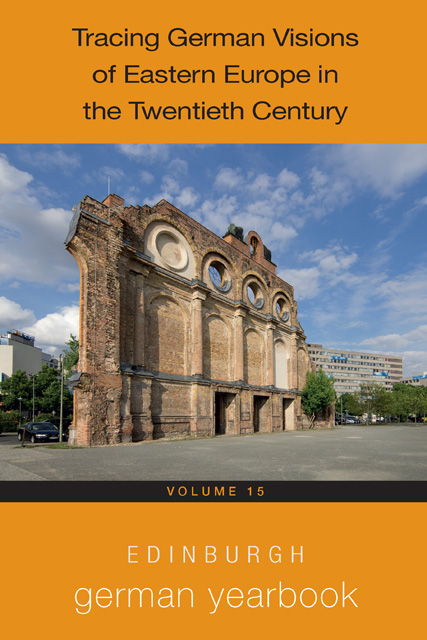Book contents
- Frontmatter
- Contents
- Miscellaneous Frontmatter
- Between Estrangement and Entanglement: An Introduction to German Visions of Eastern Europe in the Twentieth (and Twenty-First) Century
- Colonizing a Central European City: Transnational Perspectives on Kronstadt/Braşov/Brassó in the First Half of the Twentieth Century
- Exile as a Literary-Political Mission: Leo Katz’s Antifascist Bukovina Novel Totenjäger (1944)
- Brunnenland: The Image of the Bukovina in Paul Celan
- “Auch bei uns im fernen Transsilvanien”: The Transylvanian Saxons and the Long Shadow of the Third Reich in the Work of Bettina Schuller
- Through an Orientalist Lens: Colonial Renderings of Poland in German Cinema after 1989
- The Nazi Ghost and the Sinti Woman in Kerstin Hensel’s Bell Vedere (1982)
- The Haunted Landscape of Babi Yar: Memory, Language, and the Exploration of Holocaust Spaces in Katja Petrowskaja’s Vielleicht Esther (2014)
- “dann hüpfe ich auch, komisch und ungeschickt, wie eine Nadel auf einer abgespielten Platte …”: Translational Ethics and Affects in Katja Petrowskaja’s Vielleicht Esther (2014)
- Expanding the Nationalgeschichte: Multidirectional European Memory in Nino Haratischwili and Saša Stanišić
- Reading Photographic Images and Identifying Mnemonic Threads of the Post-Memorial Project in Sie kam aus Mariupol (2017) by Natascha Wodin
- Navid Kermani’s Entlang den Gräben (2018) and Its Readers: Remapping Europe’s East
- Notes on the Contributors
Navid Kermani’s Entlang den Gräben (2018) and Its Readers: Remapping Europe’s East
Published online by Cambridge University Press: 11 January 2023
- Frontmatter
- Contents
- Miscellaneous Frontmatter
- Between Estrangement and Entanglement: An Introduction to German Visions of Eastern Europe in the Twentieth (and Twenty-First) Century
- Colonizing a Central European City: Transnational Perspectives on Kronstadt/Braşov/Brassó in the First Half of the Twentieth Century
- Exile as a Literary-Political Mission: Leo Katz’s Antifascist Bukovina Novel Totenjäger (1944)
- Brunnenland: The Image of the Bukovina in Paul Celan
- “Auch bei uns im fernen Transsilvanien”: The Transylvanian Saxons and the Long Shadow of the Third Reich in the Work of Bettina Schuller
- Through an Orientalist Lens: Colonial Renderings of Poland in German Cinema after 1989
- The Nazi Ghost and the Sinti Woman in Kerstin Hensel’s Bell Vedere (1982)
- The Haunted Landscape of Babi Yar: Memory, Language, and the Exploration of Holocaust Spaces in Katja Petrowskaja’s Vielleicht Esther (2014)
- “dann hüpfe ich auch, komisch und ungeschickt, wie eine Nadel auf einer abgespielten Platte …”: Translational Ethics and Affects in Katja Petrowskaja’s Vielleicht Esther (2014)
- Expanding the Nationalgeschichte: Multidirectional European Memory in Nino Haratischwili and Saša Stanišić
- Reading Photographic Images and Identifying Mnemonic Threads of the Post-Memorial Project in Sie kam aus Mariupol (2017) by Natascha Wodin
- Navid Kermani’s Entlang den Gräben (2018) and Its Readers: Remapping Europe’s East
- Notes on the Contributors
Summary
In 2016, German-Iranian writer Navid Kermani set off on a journey east: a journey across space, but also across cultural representations of that space. The resulting travelogue, Entlang den Gräben: Eine Reise durch das östliche Europa bis nach Isfahan (2018, Along the Trenches: A Journey through Eastern Europe to Isfahan, 2020), can be read as an attempt to remap the east of Europe with an eye to changing how it is commonly perceived both in Germany and in Western Europe more generally. Like many of Kermani’s earlier works, Entlang den Gräben sold very well in Germany, was widely reviewed in the media, and was promoted on an extensive book tour. But how successful has the book been at influencing the perceptions of its readers? In this essay, I place Entlang den Gräben in the context of the broader role that the east of Europe has played in the German cultural imaginary. I also analyze Kermani’s unusual and original intervention into this discourse achieved through his self-reflexive positioning as a historical subject, as well as his selective use of tropes familiar from older German visions of the east of Europe and his strategic deployment of a variety of tropes and cultural intertexts. Last but not least, I consider his book’s reception in Germany and beyond. Since the focus is on representations of space, I pay special attention to the book’s paratextual material, which includes maps and photographs. These paratexts have interesting counterparts in Kermani’s thirteen-part travel reportage published in Der Spiegel in 2016 and 2017, which gave rise to Entlang den Gräben, and the book’s English translation—the only one that has appeared to date. While the extent of Kermani’s authorial control over these paratexts is unclear, they play a crucial role as the first indication of the nature of his project for the book’s readers.
The vast majority of scholarship on Kermani to date has focused on the topic of Islam and migration in Germany, and with good reason. His upbringing as a son of Iranian immigrants and his profound engagement with various schools of Islamic theology are clearly central elements in his works. In Joseph Twist’s words, Kermani’s writing “evoke[s] a skeptical and mystical Islam in order to convey a cosmopolitan sense of openness toward others and undermine the stable and coherent sense of self that [can be viewed] as contributing to identity conflict.”
- Type
- Chapter
- Information
- Edinburgh German Yearbook 15Tracing German Visions of Eastern Europe in the Twentieth Century, pp. 262 - 284Publisher: Boydell & BrewerPrint publication year: 2022



